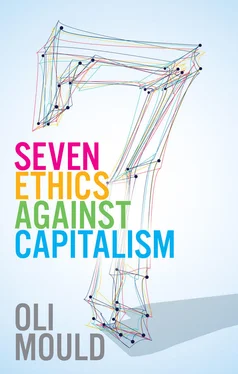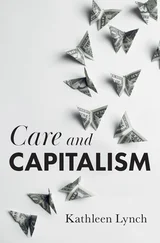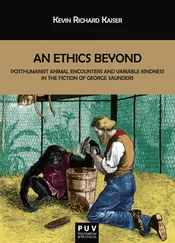Another example that extends this idea into the socio-political realm is that of Cherán in Mexico, a town that was ravaged by illegal loggers and with a corrupt local government that turned a blind eye. The locals ran them both out of town and have never let them back in. That was in 2011, and today, the town does not take part in local or presidential elections, has its own community-led security force – ronda – and governs via a group randomly selected every three years.
There are many other examples that will be alluded to throughout this book that point towards how the commons is more than a specific natural resource. It is important to note, however, that this conceptualization of the commons is not entirely new. If we delve into the etymological history, there are glimpses of this kind of planetary commons evident throughout its long and complicated epistemological construction. It has spiritual, material, political, economic and cultural underpinnings that, if teased out, can help us to affirm the kind of commons that a planetary reading of it entails. So a brief and potted history of the commons is worth outlining.
As mentioned previously, the commons is a nebulous concept, and so pinning down a history is a perilous task. History itself is a hegemonic project of enclosure, with those events, theories, ideologies and philosophies that were recorded given credence over those that were not. As such, analysing a history of the commons with the material available will inevitably err, because it relies on that which is written down (and accessible to me as an English-speaking, lowly academic researcher). So it is vital to recognize from the outset that various articulations of the commons – from a spiritual, philosophical and natural standpoint – have existed as long as humans have. From theories of property laws in Mesopotamia, 10the ancient Egyptians’ belief in the unifying force of Ma’at, the Andean goddess Pachamama, Confucianism and Taoism in ancient China and the Druids in ancient Britain, to animism among indigenous peoples, there are ancient and non-Western narratives of the physical and spiritual commons that still exist, and thrive, today. However, to grasp how the commons has developed into an ideology that exists alongside, but with the potential to resist, contemporary forms of capitalism, it is pertinent to start a history of the commons, for this researcher at any rate, at the genesis of that capitalism, namely in ancient Greece.
Heraclitus (who died c. 475 BCE) was an Athenian philosopher, and insisted that we as humans, in order to become civilized and progress as a species, must ‘follow the common’ – the common of the logos . The logos, for Heraclitus, was a philosophical concept. It was not pure order, logic or reason (as is sometimes inferred from the etymological lineage); he used it far more esoterically to denote the cosmic ‘existence’ beyond our understanding. In some of his quotes it is ‘the mind of God’ but in others not a super natural force at all; instead it is the ‘language of nature’. The logos was for Heraclitus a common experience for everyone. In his quoted sayings, he insisted on the metaphor that for those who are awake, there is only one world in common, but those who sleep withdraw into a private, self-interested world. We must therefore not act and speak as though we are asleep, but adhere to the common logos, forgoing private lives.
Moreover, the logos is unifying because it incorporates paradoxes and opposites, such as the ‘ways upwards and downwards are one and the same’, and ‘the beginning and the end are common’. Moreover, Heraclitus’ most famous quote is ‘you can never step into the same river twice’. In saying this, he was indicating that everything flows from and in the common; there is no stasis or fixity, as everything is constantly in flux; but it is the same river that flows; it is the same logos that flows. For Heraclitus, then, there is unity in the world – as each opposite cannot exist without the other – but it is a unity that flows, is never static and always changes. ‘Following the common’ for Heraclitus was the way to enlightenment, peace and self-control. Being ‘asleep’ and deviating from the common logos was to be ignorant of the truth.
Fast forward two millennia or so and the indigenous populations of the Americas are being systematically enclosed, marginalized and murdered by settler colonialists from Europe. The genocide of the Native Americans by various European monarchs in the fifteenth and sixteenth centuries is entangled with the realization of ‘the commons’, albeit as a precursor to private property rights. The ‘native’ indigenous person was seen by the Enlightenment scholars of the time as the Noble Savage ‘at one’ with nature, outside of modernity and as such part of the commonwealth of the land. 11The mutual respect shown by the native Americans and the ontological equivalence with themselves that they afforded to the land and the animals were very much part of their ancient indigenous spirituality; but very much at odds with the European mindset of seeing the world as a resource ripe for primitive accumulation. As such, the natives became simply another natural resource for the Europeans to commandeer and carve up among their fellow settlers, or indeed to ship back to Europe as slaves.
But even within Europe itself, the commons was present, though under attack from enclosure. The Diggers were a group of radical Protestants who (in the wake of the First English Civil War) believed that humans are implicitly connected with nature, and the ownership of land by individuals was unjust, immoral and illiberal. Their main protagonist, Gerrard Winstanley, wrote in 1652, ‘true freedom lies where a man [ sic ] receives his nourishment and preservation, and that is in the use of the earth’. 12The Diggers set up communes across England, the most prominent being at St Georges Hill in Surrey (now, ironically, one of the most expensive privatized and gated communities in the entire world). Although their communes were eventually dismantled, they went on to form other groups, notably the Levellers, who carried forward the idea of the ‘common’ as an alternative to private land ownership. They championed a ‘commonwealth’, a land that could produce an abundance of resources free from what they saw as the tyrannical rule of the monarchy; a common wealth for everyone. They were, of course, battling against a growing belief in self-interest as the driving force of liberty, one that reaped massive rewards for the aristocratic and mercantile elite. And so the Levellers were quashed before they could mobilize political and resistive momentum (we will return to the Diggers in Ethic 2).
Their ideological, Heraclitian stance on the commons, though, remained, and can be exemplified in many struggles across the world in the subsequent centuries. The most notable from a political perspective was in the Paris Commune in 1871, when thousands of workers, servants, refugees and middle-class Parisians blockaded themselves in the city in response to the violence of the French government. The influence of the Paris Commune on future radical political movements cannot be overstated, but what is important here is their commitment to commonality, to the rejection of individualism and the violent nationalism it entailed. Indeed, one of the main protagonists of the Commune, Elisée Reclus, argued that ‘Everywhere the word “commune” was understood in the largest sense, as referring to a new humanity, made up of free equal companions, oblivious to the existence of old boundaries, helping each other in peace from one end of the world to the other.’ 13
The Communards’ notion of the commons led to them creating a makeshift society that lasted for only seventy-two days, but one that focused on shared living and a distinct rejection of self-interest. The bloody end of the Commune at the hands of the French army represents the lengths to which the hegemony of systems of empire, colonialism and the state will go to assert its own version of progress. But the Commune also showed that in just seventy-two days, an actually existing commons was created that still influences political movements and scholarly debate today (we will revisit the importance of the Paris Commune in Ethic 5). 14
Читать дальше












